Based on such metrics as school performance, green space and cultural amenities, Raleigh, N.C. ranks No. 1 in Businessweek.com's first Best Cities ranking
Ask most people in which city they would most want to live and usually their answer would be shaped by such realities as proximity to their jobs and what they can afford. But suppose you could choose to live anywhere you wanted regardless of cost? What if you could live in a city that offered a wealth of culture, entertainment, good schools, low crime and plenty of green space? Many people might opt for the obvious choices, such as New York or San Francisco, but, great as they are, data reveals there are other cities that are even better.
| More fromBusinessWeek.com: • America's Best Affordable Places 2011 • America's 50 Most Expensive Small Towns 2011 • World's Most Expensive Cities 2011 |
Businessweek.com spent months working with data that would help us to identify the best cities in the U.S. We looked at a range of positive metrics around quality of life, counted up restaurants, evaluated school scores, and considered the number of colleges and pro sports teams. All these factors and more add up to a city that would seem to offer it all. When we began the process we had no idea which cities would come out on top. The winner? Raleigh, N.C.
Raleigh No. 1
To most residents of Raleigh, it may not come as a surprise that their city earned the title of America's Best City. Raleigh shows the cultural graces that go along with anchoring the so-called research triangle, home to North Carolina State University, Duke University, and the University of North Carolina at Chapel Hill. Among its many attributes the city sports 867 restaurants, 110 bars, and 51 museums, according to Onboard Informatics, as well as a thriving social scene, good schools, and 12,512 park acres, equal to several times the green space per capita in cities like New York and Los Angeles, according to the Trust for Public Land. It also offers a great deal on nights and weekends--from concerts and opera, to the NHL's Carolina Hurricanes and college sports, to the 30,000-sq.-ft. State Farmers Market.
Raleigh may have a population of only about 400,000 people and span about 144 square miles, yet data show it still offers a lot, if only in a smaller package. True, Raleigh may not be the center of the tech universe like San Francisco, a hub of higher education like Boston or a vibrant 24-hour metropolis like New York, but all these cities also offered high crime, a dearth of parks, poor public education and other negative factors that weighed against them.
[Click here to check home equity rates in your area.]
"We've always said, you can find about every amenity that you want, even in a city of our size," says James Sauls, director of Raleigh Economic Development, a partnership between the City of Raleigh and the Greater Raleigh Chamber of Commerce.
The city has been home to an array of celebs including Olympic champion Kristi Yamaguchi, Dexter star Michael C. Hall, and singer Clay Aiken (whose dog was even named Raleigh).
Better, Not Bigger
With help from Bloomberg Rankings, Businessweek.com evaluated 100 of the country's largest cities based on 16 criteria including: the number of restaurants, bars, and museums per capita; the number of colleges, libraries, and professional sports teams; the income, poverty, unemployment, crime, and foreclosure rates; percent of population with bachelor's degrees or higher, public school performance, park acres per 1,000 residents, and air quality. Greater weighting was placed on recreational amenities such as parks, bars, restaurants, and museums per capita, educational attainment, school performance, poverty, and air quality. As living in great cities can be expensive, affordability was not taken into account.
The data for this ranking came from the U.S. Census Bureau, U.S. Bureau of Labor Statistics, Sperling's BestPlaces, GreatSchools, Onboard Informatics, RealtyTrac,Bloomberg, and the Trust for Public Land.
After Raleigh, the next highest-ranked cities were Arlington, Va., Honolulu, Scottsdale, and Irvine, Calif. Larger cities placed lower: New York was 14th, while Los Angeles ranked 53rd and Chicago 75th. The highest-ranked city with a population greater than one million was San Diego, at seventh place. Washington D.C., which is 588,433 people large, came in sixth. Since some criteria were evaluated on a per population basis, places did not necessarily score higher for having a larger number of establishments or amenities.
At the bottom of this ranking of 100 cities were Detroit; Stockton, Calif.; Akron, Ohio; Laredo, Tex.; and Cleveland.
A Park With a City in It
Many urbanites appreciate cities' bustling streets and constant activity. Raleigh, though active, is often described as "a park with a city in it," according to the city tourism site, and the downtown area has "an attractive pedestrian mall where trees, fountains, and statuary create a shopping oasis," as described by the travel guide Frommer's. With several colleges in the area, it is also a young city and about one-fifth of the population are in their 20s, compared to a national rate of 13.8 percent, show 2010 Census data.
"The Raleigh area features a cluster of great universities, so education is part of the culture of the community," says Ford W. Bell, president of the American Association of Museums. "Integral to this culture are the region's museums, rooted as they are in education and lifelong learning."
Most residents drive, though Raleigh also has a public bus system, including a free bus service downtown.
[Click here to buy or sell a home.]
High quality of life combined with new and expanding business in the region has attracted more residents to Raleigh, one of the fastest-growing U.S. cities: the population in the metro area expanded by an estimated 12.2 percent from 2009 to 2010, according to economic and demographic data company Woods & Poole Economics.
Growing Economy
The city's largest employers are the state and public school system, according to Raleigh Economic Development. Strong technology, defense technology, biotechnology, and life sciences sectors and emerging clean tech and smart grid industries have bolstered the local economy, says Sauls.
In the weak economy, Raleigh's unemployment rate increased to 7.6 percent in July 2011 from an annual average of 4.4 percent in 2008, BLS data indicate, but joblessness in the city remains lower than the metro area, which reached 8.4 percent, and lower than the U.S. rate of 9.1 percent.
Even in today's tough environment, a number of Raleigh companies are expanding, including software company Red Hat (NYSE: RHT - News), which announced in January that it would add 540 jobs. The company had looked at other cities, but as CEO Jim Whitehurst told reporters, Raleigh offered the best overall package.
"It's a combination of things: there's a great university system here so it's easy to find qualified talent and it's a great place to hire people. The relative cost of living is low, the cost of real estate is dramatically lower [than other cities], and the state is pro business," says Whitehurst, who moved to the area in 2008 from Atlanta. And with most of the benefits of a major metropolitan area, he says, "It's a wonderful lifestyle."
The Best Cities in America
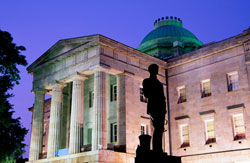 Thinkstock |
1. Raleigh
Population: 377,487
Mayor: Charles Meeker
Why it's ranked: Taking more than a dozen data points into account, Raleigh ranks as the best place to live in the U.S. The city sports a high number of bars, restaurants, and cultural institutions as well as a thriving social scene, great parks, and good schools. Raleigh shows the cultural graces that go along with anchoring the so-called research triangle, home to North Carolina State University, Duke University, and the University of North Carolina at Chapel Hill. Of course, it's also much more. The city offers a great deal on nights and weekends, from concerts and opera to the 30,000-sq.-ft. State Farmer's Market. The data backs it up. North Carolina's state capitol is top in our book.
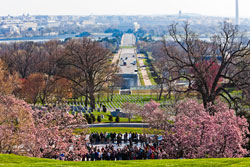 Getty Images |
2. Arlington, Va.
Population: 206,405
County Board Chairman: Christopher Zimmerman
Why it's ranked: Home to numerous headquarters of companies and government agencies, this Washington D.C. suburb is a draw in its own right. The area is highly educated, with more than two-thirds of the population holding a college degree. Arlington has a median income level of $93,806, low levels of foreclosures, and the lowest unemployment among cities we ranked. (Arlington is not incorporated as a municipality but is in the U.S. Census Bureau's list of incorporated places and was included in our survey.)
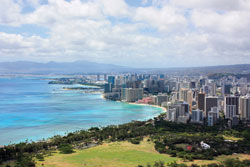 Thinkstock |
3. Honolulu
Population: 374,359
Mayor: Peter Carlisle
Why it's ranked: From the prominent slopes of Diamond Head to the white beaches of Waikiki, Honolulu is a beautiful place to live and play. The area has done well through the recession, with extremely low unemployment and a low level of foreclosures. Go surfing and hang ten, then breathe very deep because the air quality is about as good as it gets.
Which Is America's Best City?
| More from BusinessWeek.com: • America's Best Affordable Places 2011 • America's 50 Most Expensive Small Towns 2011 • World's Most Expensive Cities 2011 |
4. Scottsdale
Population: 233,105
Mayor: W.J. "Jim" Lane
Why it's ranked: A wealthy Phoenix suburb, Scottsdale has the second best schools among cities we ranked, low unemployment, and a high number of park acres per person. More than half of the population has a college degree. Like many other Arizona cities, there is a high foreclosure rate, but Scottsdale bucks the trend with low unemployment.
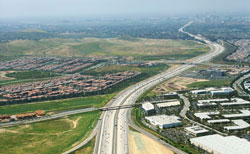 Thinkstock |
5. Irvine, Calif.
Population: 197,498
Mayor: Sukhee Kang
Why it's ranked: Settled into a broad valley between the San Joaquin Hills and Loma Ridge, Irvine is a wealthy Los Angeles suburb that sets the standard on many levels. The median income is $92,195 and 64.1 percent of the population is educated at the college level. Further, the area has the best schools among the cities on our list. In short, it's a great place to settle down.
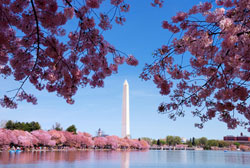 Thinkstock |
6. Washington D.C.
Population: 588,433
Mayor: Vincent C. Gray
Why it's ranked: The nation's capital doubles as a pretty cool city. There are great bars, endless restaurants for hobnobbing, and some of the best museums on the planet. On the down side, however, Washington D.C. suffers from the second- highest level of violent crime on this list and a poverty level that nears one in five citizens. However, the city is much in demand, with the lowest foreclosure rate on our list and great schools.
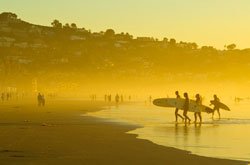 Thinkstock |
7. San Diego
Population: 1,297,618
Mayor: Jerry Sanders
Why it's ranked: It's difficult to find a city that has weather more classically perfect. Essentially, it's always sunny, flip-flop weather. So grab your surfboard and head to the beach, one of the hundreds of bars or thousands of restaurants. Or, put on a pair of loafers and head to one of the nearly 200 museums in the area. America's finest city is just waiting to please you.
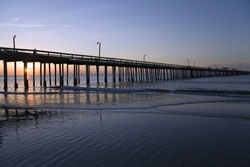 Thinkstock |
8. Virginia Beach
Population: 434,922
Mayor: William D. Sessoms, Jr.
Why it's ranked: Endless miles of sandy beaches and a happening three-mile boardwalk, along with thousands of acres of parks, make Virginia Beach a beautiful place to live. The city has low unemployment, more than a thousand restaurants to choose from, great schools, and low levels of crime.
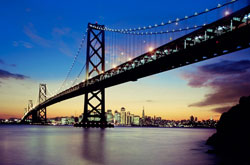 Getty Images |
9. San Francisco
Population: 797,271
Mayor: Edwin M. Lee
Why it's ranked: San Francisco has it all. From culture like the San Francisco Museum of Modern Art to the leafy trees and conservatory of Golden Gate Park to the hippie history of the Haight, the city by the bay is a thriving, soulful city. The extensive restaurants, bars, and corresponding nightlife are the cherry on top.
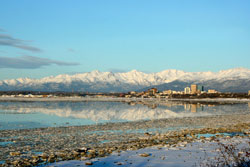 Getty Images |
10. Anchorage
Population: 291,826
Mayor: Dan Sullivan
Why it's ranked: By the numbers, Anchorage ranks high, though there are extremes in terms of light and dark, with 24 hours of daylight on the summer solstice and about five and a half hours of daylight in the winter. The city has far more park acres per person than any other city we ranked and the best air quality by a long shot. Anchorage has also done well through the downturn, with low unemployment, a high median income, and a low rate of foreclosures.
Click here to view the full list of America's 50 Best Cities




No comments:
Post a Comment